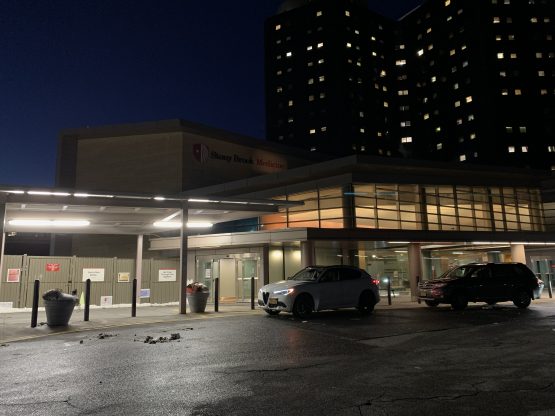
The Renaissance School of Medicine at Stony Brook University saw a 15% increase in applicants for students entering medical school in the fall of 2021, according to Dr. Jack Fuhrer, the school’s Associate Dean of Admissions.
According to the Association of American Medical Colleges (AAMC), applicants to medical school increased by a high of 17.8% for the 2021-2022 school year, accompanied by unprecedented increases among minorities.
Every year since 2020 — the start of the COVID-19 pandemic — medical school applications have increased nationwide, and are expected to keep climbing during this cycle, making medical school an even harder goal to attain.
Of the students who began medical school in the fall of 2021, the percentage of those who self-identified as Black or African American rose by 21.0%, according to the AAMC. There was also an increase of 8.3% among Asian students, and students of Hispanic, Latino or Spanish origin rose by 7.1%.
Fuhrer explained the larger application numbers stem from several factors, including the fact that some applicants are likely seeking a reliable profession in uncertain times. He added that applicants may feel the motivation to help patients and communities in a time of crisis.
Fuhrer attributed little influence to the increased media attention that prominent physicians like Anthony Fauci have received during the pandemic.
“I suspect that there were a bunch of people who had considered medicine as a career when the pandemic hit, and they saw how doctors and nurses and other health care personnel really put their lives on the line,” Fuhrer said. “They felt that there was a calling for them, and they started applying to medical schools.”
Applicants may have also been looking to take advantage of less strict application requirements this year. Many schools dropped the Medical College Admission Test (MCAT) exam requirement, pushed application deadlines further into the fall and accepted pass/fail grades for prerequisite courses, which, according to Fuhrer, most medical schools would never have done in a normal year.
In a typical year, applicants selected for an interview by the Renaissance School of Medicine would visit the school, interview with two members of the committee on admissions, attend an informational session, and get a tour of the facilities. However, like many other schools, they opted for virtual interviews instead of conducting them in person for the entering classes of 2021 and 2022.
“I felt like some interviews were tedious because I had to sit down for so long. Some of them were over four hours,” said senior biology major John Kaba about his virtual interviews. Kaba applied to medical school in the spring of 2021.
According to Kaba, some of his interview experiences were not always ideal, especially when applying to the Renaissance School of Medicine. “When I was applying to Stony, the person who interviewed me was in his clinic with alarms going off and told me he only had 30 minutes. For reference, a normal interview is over 60 minutes, so mine was super rushed,” Kaba said.
Fuhrer explained that the virtual interviews worked well, and he is expecting to continue to do interviews online.
“These virtual interviews are probably almost as good as an in-person interview,” Fuhrer said. “And it has the additional benefit of saving students a tremendous amount of financial resources.”
The pandemic also limited opportunities for pre-medical students to increase their clinical hours and partake in extracurricular activities that would bolster their application.
“COVID-19 limited the number of opportunities available and made the few left super competitive, making it harder to rack up health care hours especially. Online classes also made it harder to connect with professors and get recommendation letters,” junior health science major Shrila Shah said. Shah is planning to apply to the Renaissance School in the upcoming cycle.
The Renaissance School of Medicine typically accepts a significant number of out-of-state applicants, with approximately 25% of the entering class for the last 4 years having been out-of-state residents.
For students like Kaba, this made admissions even harder, because states responded to the pandemic differently; some allowed students to get volunteering and clinical experiences, while others were more limited in their activities.
According to Fuhrer, the admissions committee is fully aware of how the pandemic affected students and continues to take into consideration that the last two years have limited applicants’ ability to get clinical experiences.
The pandemic also brought into light social justice issues, such as disparity in access to health care; according to the US Department of Health & Human Services, COVID-19 disproportionately affected low-income communities and people of color. Concurrent incidents of racial strife around the country have further emphasized inequities and their impact on citizens’ health.
According to Fuhrer, the admissions committee at the Renaissance School of Medicine noticed the impact of movements like Black Lives Matter, and in response, added a question to the supplementary application that dealt with social justice and the disparity in health care access.
“People of color have been disproportionately affected by this pandemic. We need to do something about that. And so, the admissions process adapted to be not only cognizant of those issues, which we were always sensitive to, but to doing something about it in a real positive way,” Fuhrer said.











